Joy Neal Kidney's Blog, page 35
July 10, 2023
There is No Understanding Suicide by Michael Walrod
This quote from Mother Teresa was part of his Facebook post, January 19, 2020:

By Reverend Michael “Wombat” Walrod:
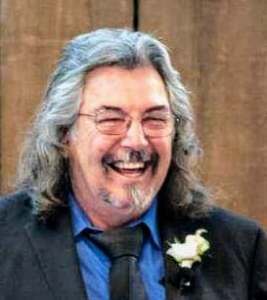
Good morning my brothers and sisters.
After officiating at a Celebration of Life yesterday for a young man who took his life thought this to be very befitting. Was a very sad and emotional day for many. Did have some humorous moments and hope that some how those in attendance found some comfort, peace, and somewhat of an understanding.
To stand there and hug a father whose pain you know and understand, to hug a sobbing mother who found comfort knowing you have been through what she is going through, to hugging and talking with a 13 year old boy who is hurting, confused, and feeling guilt over his dad’s death, to having a 4 year daughter of the deceased giving you a hug because she knows you need one, to hugging his friend after he eulogized his dead friend, to hugging people you don’t know but are in pain and they need comfort, to meeting a brother and son who has the best behaved children and great wife to support him, to talking with a man who found his son before it was too late.
Yesterday, on the way over to Adel for service a lot of memories from 17 years and 4 months ago started flooding back. The time when my family went through this with Clint. I prayed for strength, for Clint to stand beside me and he did, for understanding. And suddenly something hit me that l think l have actually known all this time but just have never grasped it.
 I finally realized in understanding suicide, one must get to the point of understanding there is no understanding it. And when you do you will find some peace. I found that yesterday.
I finally realized in understanding suicide, one must get to the point of understanding there is no understanding it. And when you do you will find some peace. I found that yesterday.
As l looked out my window after this hit me I watched a bald eagle fly over and stop and hover as l passed. The Spirit was speaking. Always remember, it gets better no matter what.
Hope all can find some peace and happiness today. Stay warm and GO CHIEFS. Peace and enjoy life.
Oh yeah also at service l screwed up when l was talking about how a child’s death is harder on the mother. How their bond starts before birth, how she carried him for 9 months, fed him, and then l said she nurtured him but l slipped up and said neutered him. One lady corrected me right away. A lot of laughter filled the room after that one.
RIP Cade Long!
—–
Michael Walrod has a heart of gold. Since his ordination six years ago, he’s held dozens of celebrations of life services. Working through many losses in his own life has given him such empathy for grieving families.
—–
2023 note from Michael: To all that have helped in the past with donations for the Clint Walrod Memorial Race, I want to thank you from the bottom of my heart. I have informed Mike V at Stuart Speedway that I want this to be the last year for this race.
It is time for me to move on and let go of some things and this is one. We are looking for donations for this last event. . . . Hope to make it the biggest ever. Thanks for the support. Love you all. Peace

Please make out checks to Stuart Speedway and mail to the above address, or use Mike’s Venmo account.
Michael Walrod is suffering from depression and said he might not even be able to attend this last race named for the son he lost in 2002.

July 7, 2023
Bananas–everything you wanted to know about them and more
My daughter-in-law brought three books she thought I might enjoy. One was called Banana: The Fate of the Fruit That Changed the World. Well, it’s everything you wanted to know about bananas and then some! (Short review below)
But it reminded me of a couple of banana stories, a Depression Era one from my mother, and one from my trip to Bosnia in 2001.
The Goff Reunion
The summer of 1931, one of Leora’s brothers drove their widowed mother, along with cousins Doris Wilson and and Maxine Goff to the Goff reunion. Grandmother Goff took bananas to share. They were not common in Dexter, Iowa, in those days, so were a real treat. She cut them in half to serve at the potluck. Mostly the kids chose them, and someone ate so many he got sick. Doris, almost 13, had never tasted a banana before. Bananas had been shipped to the US for years, but probably wasn’t common in Dexter, population 748, during the Depression.
Bosnia
I visited Bosnia in 2001 with a family who came to Iowa as refugees of the Bosnian war. I’d helped teach English as a Second Language (ESL) and accompanied Zlatka to the doctor for prenatal visits, even being with her during labor and delivery when Adis was born in 1997.
It was still common for the breadwinner of a family in Bosnia to have a job in another country. Zlatka’s father, who worked in Austria, returned home to Skokovi while we were there, bringing bananas (among other things) with him. At least four of his grandchildren were there that day. The room became so quiet as they settled down to enjoy those bananas. I’ll always remember how their grandfather beamed as watched his grandchildren savor those treats.
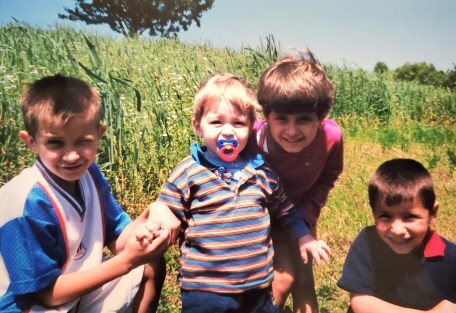 Cousins Dzemal Kovacevic (age 6), Adis (almost 2) and Dzenaela Dogic (5), Rifet Kovacevic (5), near Skokovi, BiH, June 2001
Cousins Dzemal Kovacevic (age 6), Adis (almost 2) and Dzenaela Dogic (5), Rifet Kovacevic (5), near Skokovi, BiH, June 2001The Book
 My thoughts on Banana: The Fate of the Fruit that Changed the World: This book is everything you ever wanted to know about the ubiquitous banana, and then some. Besides why banana peels are funny, the history of the popular fruit is fascinating and horrifying, from dodging diseases, cruel economics, and complicated politics.
My thoughts on Banana: The Fate of the Fruit that Changed the World: This book is everything you ever wanted to know about the ubiquitous banana, and then some. Besides why banana peels are funny, the history of the popular fruit is fascinating and horrifying, from dodging diseases, cruel economics, and complicated politics.
Belgium is the center of studies by banana scientists, with dozens of varieties grown on several continents. At the end of this very thorough book, written by Dan Koeppel, is a banana timeline, a bibliography, and an index.
Doris’s story is from Leora’s Dexter Stories: The Scarcity Years of the Great Depression. The 1931 Goff reunion was a memorable one for Doris, for two more reasons than her first banana.
July 5, 2023
A Fork(lift) in the Road by Robert Frohlich

It seemed straightforward enough. The Appalachia Service Project (ASP) needed a new forklift for their warehouse in Johnson city, Tennessee. My friend Jack was in the used equipment business, so all we had to do was raise about eight thousand dollars and find a good used forklift for that price.
I obtained a mailing list from ASP headquarters, and sent letters to all the churches that had sent mission teams to work with ASP in the past. The necessary money flowed in, and Jack found the ideal forklift right here in our hometown, Racine, Wisconsin. Then it got complicated.
One cold December afternoon, we loaded the forklift onto a flatbed trailer, hooked on to Jack’s old International tractor truck, and headed for Tennessee. About three hours into our journey, somewhere in Indiana, Jack said, “Something doesn’t sound right.” I trusted Jack to know what he was talking about, because to me, that old diesel truck always sounded as if something was about to break. We turned into a huge truck stop where Jack listened to the engine, and declared it to be near terminal. Meandering into the dining facility, we found a seat and Jack called his wife to come rescue us. Three hours in a truck stop, eating bad chili and drinking strong coffee; not what I had in mind when we left Racine. Charlotte, Jack’s wife, was probably not thrilled either about heading out at night to drive through Chicago to pick up two grumpy men. Arriving back in Racine after midnight, Jack said he’d figure out what to do, and call me in the morning.
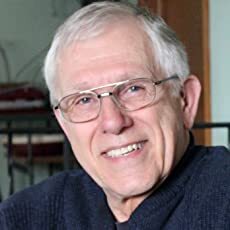 Early the next day, I picked up Jack at his house, and drove to Milwaukee where he rented a tractor, an International COE (Cab Over Engine) with a very hard to shift transmission (more about that later). We came back to my house to drop off my car, and then drove off in a blinding snowstorm back to Indiana and Tennessee. I clearly recall seeing my wife, two daughters, and my mother (who was visiting us at the time) staring out the living room widow as we departed. Were they filled with trepidation or were they simply astonished by our foolishness? Jack, looking at the snow coming down, said, “You’d better buckle up and hang on.” Fun times.
Early the next day, I picked up Jack at his house, and drove to Milwaukee where he rented a tractor, an International COE (Cab Over Engine) with a very hard to shift transmission (more about that later). We came back to my house to drop off my car, and then drove off in a blinding snowstorm back to Indiana and Tennessee. I clearly recall seeing my wife, two daughters, and my mother (who was visiting us at the time) staring out the living room widow as we departed. Were they filled with trepidation or were they simply astonished by our foolishness? Jack, looking at the snow coming down, said, “You’d better buckle up and hang on.” Fun times.
Back at the truck stop, we unhooked the trailer and attached it to the rental truck. We traveled without further incident all the way to Corbin, Kentucky where we stopped for the night. Good thing too, because the next day would be a long one.
Try not to hit anything
Next day, we made our way to Johnson City, arriving at the ASP warehouse around mid-morning. The forklift got unloaded, but the new operators promptly got it stuck in the mud. So Jack used his truck to get it unstuck, and we left the happy ASP crew to play with their new toy. I think Jack mumbled something about Louisville but I was a little surprised when we pulled off there on the way back north. I found that his objective was a used articulated front end loader that he had purchased for one of his customers. We got that big thing onto the flatbed, and headed out once more. I started thinking about supper and another motel room. It soon became evident that that was not the plan. Somewhere in southern Indiana, Jack pulled off to the side of the road and said, “I need you to drive for a while so I can think. Try not to hit anything, because I didn’t put your name on the rental agreement.” OK. It’s winter. There’s icy spots on the road. It’s dark out. The stupid shift lever is hard to move and, oh by the way, I’ve never driven a truck like this! So you go ahead and think, while I death-grip the steering wheel, try to shift without grinding the gears, and pray.
About an hour later, I pulled into the truck stop which was beginning to feel a little too much like home. It was then I noticed that the pavement looked kind of shiny; ice shiny. We were approaching a building, behind which was parked Jack’s old truck. I hit the brakes to slow down to turn. Trucks, especially big trucks loaded with heavy equipment, operate somewhat less responsively than my car does. The whole mess was just sliding along on the ice, my death grip exerting maximum force until the truck shuddered to a halt and the engine stalled. “I’ll take it from here” Jack said.
Behind the building, we saw another driver having ice trouble; basically his tractor-trailer was not moving though the wheels were spinning. Jack said, “Go tell that guy to hang on, we’ll help him in a minute or two..” A chain and a good tug, and the other driver was free. Then I found out what Jack was planning. He moved the front end loader as far forward on the trailer as it would go. Then he lowered the ramps and drove his truck up onto the trailer; its rear wheels just inches from the back end of the trailer. He snugged everything down tight, climbed back into the cab, and we drove off into that dark and slippery night. Surely, we must have stopped for coffee first, but I really don’t remember.
We got back to Racine about midnight. Our simple plan to buy a good forklift for ASP turned into a long (and for Jack, costly) adventure. One of Jack’s frequent sayings was, “No good deed goes unpunished..” This story is just one example of how this became his catch phrase.
Jesus said it differently however. “I have told you these things, so that in me you may have peace. In this world you will have trouble. But take heart! I have overcome the world.” John 16:33 (NIV)
Robert has shared three stories on Our American Stories, two more about adventures with big trucks, one about his German-born grandfather who helped build the “Arsenal of Democracy” during WWII.
Robert Frohlich has written a compelling autobiography, Aimless Life, Awesome God.
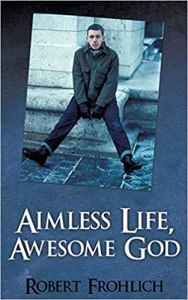
June 30, 2023
Invitations to Write Book Endorsements
There’s a subtle shift in things once you’ve published a third book. I guess that with it comes the perception that you’re a real author, but I was still amazed the first time I was invited to endorse someone else’s book.
Most of the requests for endorsements have been because of a short review I’d written for an earlier book (on Amazon, Goodreads, and BookBub). This new role as cheerleader for other authors is humbling, fulfilling and such fun!
You’d enjoy the two books already published:
 See Jane Sing by Jolene Philo. See Jane Run was her first one, which I’d enjoyed and reviewed. She has at least two more delightful “Jane books” underway about a plucky young teacher, away from home (Iowa) for the first time, who helps solve a who-done-it in small town South Dakota. Jane gains a passel of captivating characters, some charming, some not so! Each book has a specific recipe at the end.
See Jane Sing by Jolene Philo. See Jane Run was her first one, which I’d enjoyed and reviewed. She has at least two more delightful “Jane books” underway about a plucky young teacher, away from home (Iowa) for the first time, who helps solve a who-done-it in small town South Dakota. Jane gains a passel of captivating characters, some charming, some not so! Each book has a specific recipe at the end.
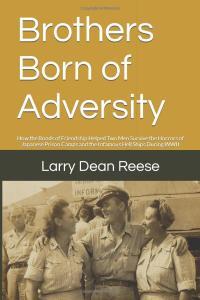
Brothers Born of Adversity: How the Bonds of Friendship Helped Two Men Survive the Horrors of Japanese Prison Camps and the Infamous Hell Ships During World War II by Larry Dean Reese. I had reviewed his earlier book about Iowa pioneers. When I learned he was working on a book about WWII from the memories of two men who survived this history, I encouraged him. I’m thankful they will never be forgotten.
These three winners will be published yet this year:
Dillon’s War: Tracing the Steps of a Spearhead Driver for an Artillery Forward Observer through Europe in World War II by Dennis Peterson (due any day). We became online friends a few years ago because of his memoir, Look Unto the Hills: Stories of Growing Up in East Tennessee. Dennis also writes scholarly Christian histories, and he endorsed Leora’s Early Years: Guthrie County Roots. Dillon’s War is based on details from the eight letters written home by Dennis’s uncle, set in the grueling history of the unit he served with.
Cameron Lost, a novel by Craig Matthews is coming out in August. (Just this week I got a first glimpse of the powerful cover). I became acquainted with Craig through his book Immigrant Patriot, then The Stars in the Sidewalk (about the brutal affects of a broken past). After I’d reviewed them both, Craig asked if I’d read his latest manuscript, which he’d become discouraged with. It’s a gritty but amazing redemption story of a family member. I gratefully said yes to endorsing it.
The Legacy of the Rustic Rose Quilt by Cherie Dargan is to be published this fall. Cherie’s first book, The Gift: The California Quilt–dual time, historical fiction, set in Iowa, involving an old quilt with a mystery–is so compelling. I was a beta reader for this book, with its historical line set in WWII.
Cherie’s new book is a very moving and important Civil War story–also dual time, historical fiction, culminates in Iowa, involving an old quilt with another mystery. (I’ve seen a photo of the beautiful historic quilt.)
I’m grateful to officially champion these authors and their books!
June 29, 2023
I Attended the Writers Conference After All!

Last spring, I admitted to someone that I wouldn’t be able to attend the Cedar Falls Christian Writers Conference, that I’d become more disabled since the last one I’d been to in 2019.
But that confession seemed to plant a seed. It wasn’t long before I began to notice God’s nudgings about what it would be like to e at the conference, thanking those who’d given feedback through the years for what became Leora’s Letters.
I rented the closest cabin (to escape to for needed naps), signed up for the conference, and began to pray about it. Even though my favorite chauffeur has started down the path of his own health challenge, he said he’d take me–a two hour drive (from the Des Moines area) four times, since he’d come home in between.
I’d taken part in this conference four or five times, but this would be my first as an author! I wanted to let others know how I’d been supported by this group, even since 2019.
My New Role
In recent months I’d embraced an unexpected and humbling affirmation when invited to write endorsements for other authors’ books. The conference would be an opportunity, in this new role, to encourage beginning writers, or ones not published yet. The CFCWC became the highlight of the month.
The Conference
When the day came, we arrived in Cedar Falls early enough to try the Dairy Cream near the campground. They have black raspberry swirl! Guy helped me get settled before Thursday evening’s creative activity. Mary Kenyon provided materials for spiritual vision journey boards, suggesting that we meditate on Philippians 4:8, asking the Holy Spirit to guide each to a focal point. With just three others at a table, we got acquainted right away. The evening set the tone for the entire conference.
Co-coordinators Mary Kenyon and Nick Portzen, along with their in-town team, were superb. A beautiful Spirit permeated the whole gathering.
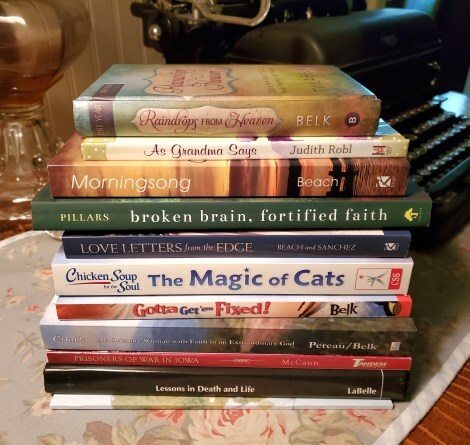 I’d already read several books by Mary Kenyon, Sheri Shonk, and Cherie Dargan, so I’m awaiting their newest ones. Craig Bishop’s book about Billy Sunday has already gone home with our house painter (along with two sets of “Leora books).
I’d already read several books by Mary Kenyon, Sheri Shonk, and Cherie Dargan, so I’m awaiting their newest ones. Craig Bishop’s book about Billy Sunday has already gone home with our house painter (along with two sets of “Leora books).During the next two days, we all attended some of the inspirational presentations, and sometimes we could make choices between two workshops. Alas, I missed a few when my body insisted on naps, but I sopped up information and met new people between presentations.
Authors were given space to display our books, which was fun my very first time. I didn’t sell many books, but I did bring home a dozen from other authors who were there!
The Best Part
The best part of the conference was getting acquainted with the attendees and presenters, with their stories, with what they felt God had prompted them to write about. What a delight to find fledgling writers with compelling ideas and topics I could cheer for!
Well, Saturday evening came quickly. My favorite chauffeur and I took time for black raspberry swirl at the Dairy Cream before heading home.
Afterwards
The incredibleness wasn’t done. Monday I learned a poem I’d entered will be published in Lyrical Iowa this year. Tuesday I was invited to speak to a local book club next month. Wednesday I was invited to submit a story about Independence Day.
Wednesday night, I came down with hives, although I didn’t know that’s what the misery would turn out to be. I spent Thursday applying hydrocortisone cream to rashes, only to have those calm down and break out somewhere else. Friday, I discovered that the hives was likely due to the effort it took to be at the conference. Yes, it was worth it!
Since then I’ve been reading and leaving short reviews for the books I’d bought, sharing across social media. What a delight to support them on their writing journeys, while still basking in the Spirit from the conference I thought I was too disabled to attend.
“Finally, brethren, whatever is true, whatever is honorable, whatever is right, whatever is pure, whatever is lovely, whatever is of good repute, if there is any excellence and if anything worthy of praise, dwell on these things.” – Philippians 4:8
 Most of us attendees at the 2019 conference.
Most of us attendees at the 2019 conference.
June 28, 2023
“As Grandma Says: Timeless Words to Live By” by Judith Robl

The Book
Drawing on her grandma’s lifetime of learning and biblical wisdom, Judith Robl provides charming devotions to help women embrace timeless principles and pass them along to those they love. Each offering is adorned with artist Audrey Jeanne Roberts’ endearing paintings of teacups and other charms of hospitality and generosity.
Readers will discover the blessings of Scripture verses that support each insight, the strength of personal prayers, and life-shaping teachings from Grandma including:
Success is getting up one more time than you fall down.Give generously from your own purse.One good turn deserves another.This beautiful volume of wisdom encourages confidence, generosity, honor, and faith and makes a great gift of guidance and love for graduates, new brides, friends, and for moms to give to their daughters for any occasion or “just because.”
The Author
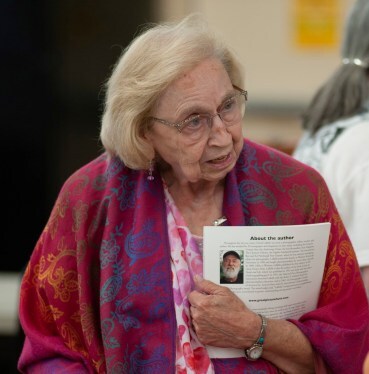 Cedar Falls, June 9-10, 2023 © Dave LaBelle
Cedar Falls, June 9-10, 2023 © Dave LaBelleReared in an ordinary small town in rural Kansas, Judith Robl led an ordinary life. She went to college locally, married a teacher/farmer, reared a family. Life was good. Then violence invaded her life and the lives of those around her .
Coping with the aftermath of that violence taught her much about patience and perseverance, forgiveness and faith. Because of the questions and reactions of those outside her family, she began to realize that there is a large, hurting world of people who do not have the faith grounding that was her privilege in youth.
She speaks and writes to help others forge a deep root of faith that will carry them through the worst the world and the enemy can do.
My thoughts: You can just hear the author’s wise grandmother advising youngsters with her pithy sayings, such as, “If your head won’t work, your heels must,” “Success consists of getting up one more time than you fall down,” and “You can’t stub your toe unless you are moving forward.” As Grandma Says is such a beautifully illustrated little book. Each of the nearly 50 sayings includes a story of the grandmother, a related Bible verse, a compelling comment, and a prayer.
I met the delightful Judith Robl at the 2023 Cedar Falls Christian Writers Conference. She’d paid for her cousin to attend with her, and to drive her from Kansas to Iowa. While I was at an author table with my “Leora books,” Judith came over to take a “selfie” with me and get acquainted. Among other things, she asked if I remembered World War II. I later wondered whether it was her way of finding out which of us is older.
Judith has started another devotional gift book. She says if you’d like to follow that progress, and even offering input, join her here.
June 26, 2023
When Leora Met Clabe
Leora’s Grandpap and Grandmother Jordan (David and Emilia) had lived on a farm just east of the village of Monteith, Iowa, since just after the end of the Civil War. Their oldest child was Laura Arminta, born in 1868. Their youngest was Frederick David Jordan, born in 1889.
Laura Arminta married Sherd Goff. Their oldest child, born in 1890, was Leora. Yes, young Fred Jordan was the uncle of Leora Goff, with just over a year’s difference in their ages.
 David and Emelia Jordan are at the left, with their youngest child Fred Jordan. Next is the oldest Jordan sister, Laura Jordan Goff, with daughter Georgia Goff in front. Laura’s oldest child was Leora, who is at the far right. Young Fred Jordan was Leora’s uncle. 1897, Monteith, Guthrie County, Iowa
David and Emelia Jordan are at the left, with their youngest child Fred Jordan. Next is the oldest Jordan sister, Laura Jordan Goff, with daughter Georgia Goff in front. Laura’s oldest child was Leora, who is at the far right. Young Fred Jordan was Leora’s uncle. 1897, Monteith, Guthrie County, IowaAs a young adult, Leora took turns with her sister Georgia staying with their elderly grandparents, helping them even after they retired into the village of Monteith. When Grandpap Jordan died in early 1913, Grandmother Emilia enjoyed the companionship of a granddaughter even more.
In 1909, Fred Jordan, Emilia’s youngest son and Leora’s uncle, married Rectha Wilson. They also lived in Monteith.
In 1913, Leora and her grandmother Emilia walked to Fred and Rectha’s to see their new baby, Leonard Clabe Jordan. They had another visitor, Rectha’s brother Clabe Wilson.
And that’s how Leora met Clabe.
Leora grew up in a large family who enjoyed visiting and having rousing discussions. She could start up a conversation with anyone, a winsome asset around a handsome man of few words.
In June of 1913, Clabe sent her a tentative Good Luck postcard, signed “C.D.W.” That’s all that was on it. I guess it was his way of letting her know he was interested. . . . early “texting.”
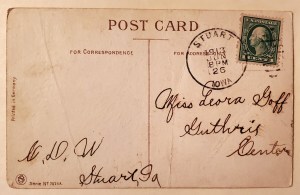

It evidently worked. She replied with a To Greet You card. “Dear friend,” it began, then some chitchat, ending “Answer soon. L.G. Guthrie Center.”
Their first real date was to the Chautauqua in Panora in June of that year, traveling there (and everywhere else) by horse and buggy. The Chautauqua advertisement offered “a new set of delightful surprises every day” to the citizens of Guthrie County. “Fine education and uplift. It’s an educational picnic.”
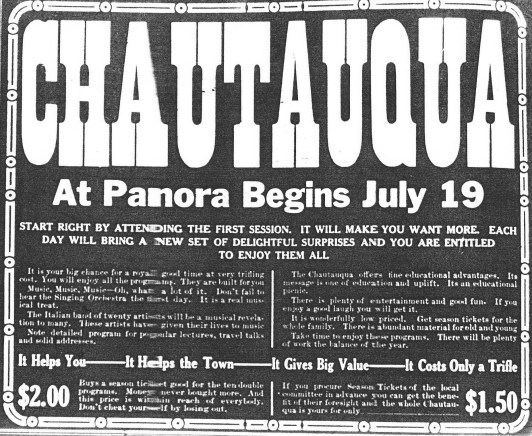
An easy way for shy Clabe to get acquainted with Leora.
June 23, 2023
Louise Oehlman Took in the Orphaned Daughter of the Clampitts
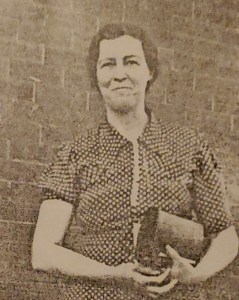 Louise Oelhman
Louise OelhmanThe kindness of a Dexter teacher to a family living in poverty during the Great Depression is evident in a family story from those years. Since Delbert and Donald Wilson didn’t have suitable clothes for the junior banquet, they didn’t want to go.
Miss Oehlman came to the house. She and their mother Leora sat outside on the top step, talking quietly. “They are important members of their class,” Miss Oelman said. “I’m sure I can borrow suits for them, if it would be all right with you.”
The brothers got to attend the banquet.
Louise Oehlman was also a favorite teacher of my mother’s, who was Delbert and Donald’s younger sister.
Recently I learned more about this remarkable woman. When she taught in Dexter, W.D. Clampitt was the school superintendent.
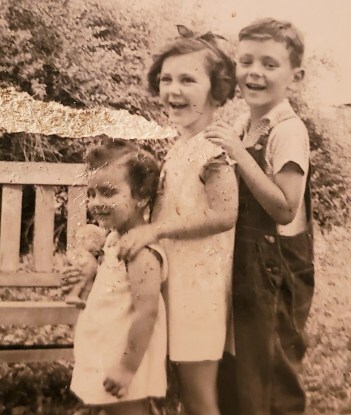 Lois, Doris, and Ralph Clampitt, Dexter, Iowa, 1936
Lois, Doris, and Ralph Clampitt, Dexter, Iowa, 1936Mr. Clampitt and his wife had three children. Doris was born in 1929, Ralph in 1931, and Lois in1935. During WWII, the Clampitts moved to Johnston, Iowa, where he was superintendent of schools.
Doris Clampitt died in 1943, at only age 14. Mrs. Clampitt died three years later, leaving Mr. Clampitt a widower with a son who was 15 and an 11-year-old daughter. Mr. Clampitt died two years later, leaving two children, ages 17 and 13.
Louise Oehlman returned to her hometown of Derby, Iowa, where she served as the school superintendent for twenty years.
I found information about the orphaned Clampitt children through Find a Grave. From the obituary of the youngest daughter, Lois: “Upon her parents early passing, she was raised by a dear family friend Louise Oehlman in Derby, IA.”
I wonder whether my mother knew this story about the kindness of a favorite teacher.
June 21, 2023
Former Boxer W.D. Clampitt, Dexter School Superintendent
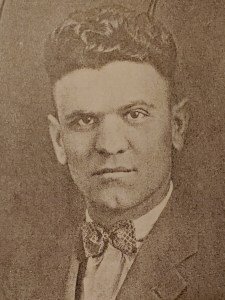 Supt. Wesley D. Clampitt, Dexter, Iowa
Supt. Wesley D. Clampitt, Dexter, IowaRemember the school superintendent who played marbles with the high schoolers? Wesley David Clampitt had an interesting history, including attending Frog Pond School with Clabe Wilson.
Wesley Clampitt was born in 1899 in Monteith, Iowa, to Reverend Henry Thornton and Alice Clampitt. In 1918, he graduated from Guthrie County High School in Panora and enlisted in the First World War June 3, 1918. After spending 15 months in France, he was discharged in 1919 at Camp Dodge.
For three years he was a member of an undefeated boxing team, and in 1924, was mid-west champion in semi-final Olympic tryouts in Boston.
Even before earning his degree, W. D. Clampitt taught in Adair County and was a bookkeeper for a Red Oak auto company. From 1924 to 1927, he was high school principal and coach at Bondurant, then superintendent of schools at Farrar from 1927-1929.
He earned a BS degree from Iowa State College in 1929, and a MS from Drake University in 1936.
He married Evelyn Atwood in 1924 in Monteith and had three children. Doris was born in 1929, Ralph in 1931, and Lois in1935.
W. D. Clampitt was superintendent of schools in Dexter from 1929-1942. About 1934, a schoolmate of cousins Merrill Goff and Junior Wilson needed a smoke, so the boys went with him, out behind the fifth and sixth grade building. Both tried smoking. Mr. Clampitt happened to check out the science room window and didn’t like what he saw. He spanked the boys and warned them not to get caught by the nicotine habit. After school let out he paid a visit to their parents to let them know what he’d done. They approved.
Next he served at superintendent of schools at Johnston, Iowa. The spring of 1943, Dale Wilson was home to the Minburn farm on furlough after receiving his commission and pilot’s wings. Taking him back to the train station in Des Moines, the Wilsons stopped at the Johnston high school so Dale could see Mr. Clampitt, his well-liked former superintendent. Mr. Clampitt introduced Dale to his senior class and asked him to say a few words, and also walked out to the car with Dale to greet Clabe and Leora and ask about the others.
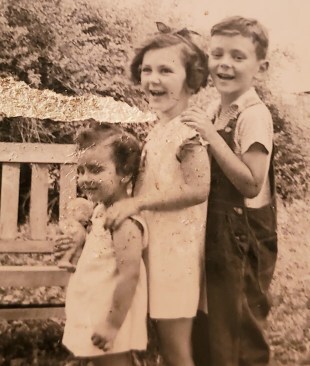 Lois, Doris, and Ralph Clampitt, Dexter, Iowa, 1936
Lois, Doris, and Ralph Clampitt, Dexter, Iowa, 1936Doris Clampitt died in 1943, at only age 14. Mrs. Clampitt died three years later, leaving Mr. Clampitt a widower with a son who was 15 and an 11-year-old daughter.
Wesley D. Clampitt died at the age of only 49 in 1948, leaving two children, ages 17 and 13. He is buried in Dexter Cemetery.
W. D. Clampitt was a member of the American Legion, Iowa State Teachers Association, Dallas County Schoolmasters Association, the Stuart Golf Club, the Community Club, Masonic Lodge, the Christian Church, and enjoyed fishing, hunting, and golfing.
The smoking episode is from Leora’s Dexter Stories: The Scarcity Years of the Great Depression. The story about Dale home on furlough and stopping to see Mr. Clampitt is from Leora’s Letters: The Story of Love and Loss for an Iowa Family During World War II.
June 19, 2023
Books with Patriotic Themes
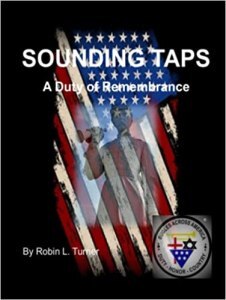 Sounding Taps by Robin Turner
Sounding Taps by Robin Turner
Subtitle: A Duty of Remembrance. This is a beautiful book to savor, story after story. The author was bothered at a burial service by “an undignified, electronic bugle rendition of something that sounded like Taps.” A veteran himself, Robin Turner learned to play the bugle. He was so moved by the experience of sounding Taps that he visited several cemeteries to seek out veterans’ gravesites to honor them with the soulful cry of his bugle and a salute. A poignant reminder of those Americans who’ve served our nation.
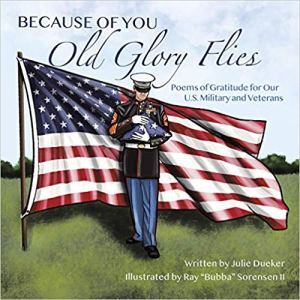 Because of You Old Glory Flies by Julie Dueker
Because of You Old Glory Flies by Julie Dueker
Subtitle: Poems of Gratitude for Our U.S. Military and Veterans. There are only eight poems in this delightful collection of remembrance and gratitude for our volunteers in the American military, but they are powerful reminders of those who’ve served the rest of us. “Think of Me” emphasizes a reliance on God in whatever circumstances a warrior has found himself in.
I enjoyed recognizing the illustrator’s children in one poignant drawing. The illustrator is Ray “Bubba” Sorensen II, known across Iowa as the artist for the Freedom Rock north of Greenfield, but also of Iowa’s Freedom Rocks, with the goal of one in each of Iowa’s 99 counties to promote tourism in the state.
I’m especially captivated by this collection of original poems by Julie Dueker.
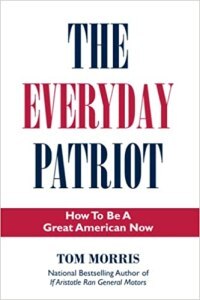 The Everyday Patriot by Tom Morris
The Everyday Patriot by Tom Morris
Subtitle: How to be a Great American Now. Inspired by the words of “our national birth announcement,” our Declaration of Independence, this public philosopher posits that patriotism isn’t flag-waving emotion. He insists that each of us, doing what we can for good in our own space, then radiating to our neighborhood, town, and beyond can help rekindle the nations ideals. Those ideals reach out beyond the USA to encourage the best in other nations, a radical but valuable idea for all humans.
The F4ith of July by Baron D. Hall
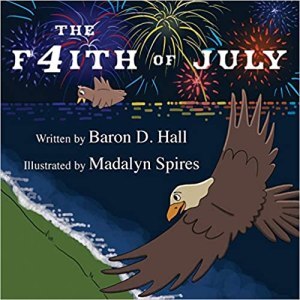
This picture book is a fun reminder for adults of why we celebrate Independence Day while teaching youngsters what’s important about the holiday. The activity of finding the hidden Liberty Bells is a delightful addition. The book has engaging illustrations by the author’s niece. Our granddaughter will enjoy this one.



